Arts & Literature _|_ Issue 20, 2022
Poetry in the Contemporary World: Conversations with Jane Hirshfield
Jane Clark and Barbara Vellacott talk with the distinguished poet about her latest work and the role of poetry in these difficult times
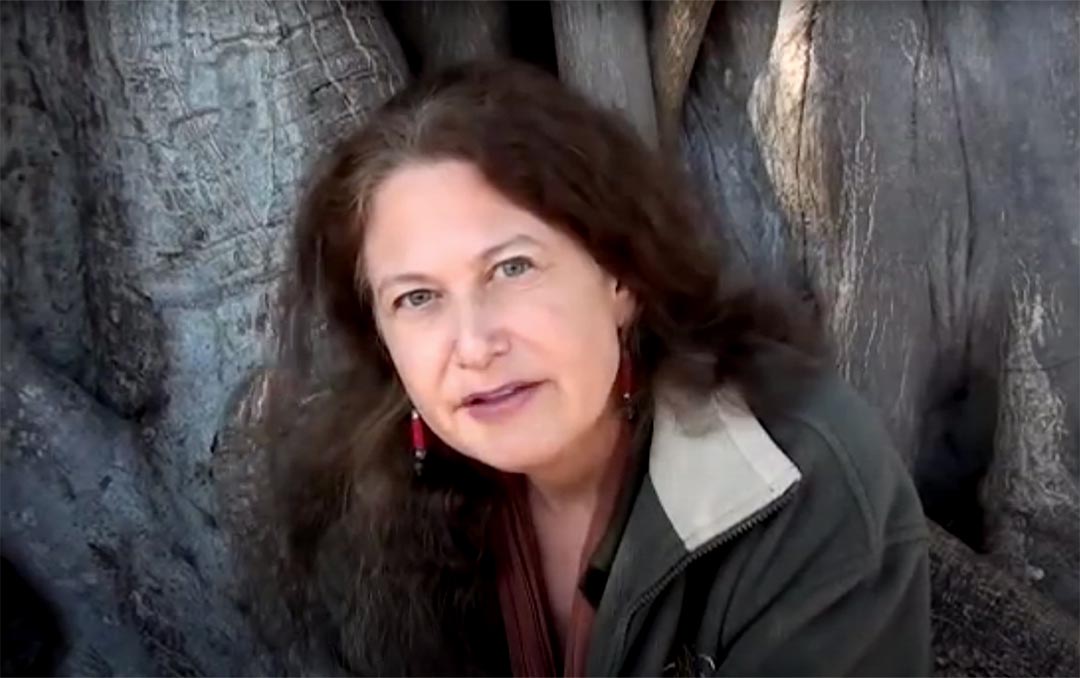

Poetry in the Contemporary World: Conversations with Jane Hirshfield
Jane Clark and Barbara Vellacott talk with the distinguished poet about her latest work and the role of poetry in these difficult times
Barbara: Having read and appreciated your latest book, Ledger [1] we’re struck by three strands which seem to appear often in these poems, as well as in earlier collections. For each, we have chosen one poem which seems to embody it, and you have very kindly done a reading of it specially for our readers. Our first theme is ‘Joy and Surprise’ as it is expressed in the poem ‘My Debt’ (see Jane’s reading right or below).
My Debt
My Debt
.
Like all
who believe in the senses,
I was an accountant,
copyist,
statistician.
Not registrar,
witness.
Permitted to touch
the leaf of a thistle,
the trembling
work of a spider.
To ponder the Hubble’s recordings.
It did not matter
if I believed in
the party of particle or of wave,
as I carried no weapon.
It did not matter if I believed.
I weighed ashes,
actions,
cities that glittered like rubies,
on the scales I was given,
calibrated
in units of fear and amazement.
I wrote the word it, the word is.
I entered the debt that is owed to the real.
Forgive,
spine-covered leaf, soft-bodied spider,
octopus lifting
one curious tentacle back toward the hand of the diver
that in such black ink
I set down your flammable colors.
.
Barbara: We wonder what you are most touched by in your own poem. Is there a key line or image for you, the poet?
Jane H: Many images in this poem are what I sometimes think of as tender discoveries, descriptions whose ‘finding’ in some small way rearranges psyche and understanding. The choices of one word and not another – of ‘permitted’ say, or ‘calibrated in units of fear and amazement’ – were long pondered before chosen. The distinction between ‘registrar’ and ‘witness’ has an ethical component: it holds what I hope is a right humility in our relationship to the larger world.
Still, what affected me most in this poem was the whole of it. Its arrival came as an answer to exigent need. I had, not long before, written another poem in the book, ‘Ghazal for the End of Time’. The darkest poem in a book greatly dark already, it faces directly into the catastrophes of climate change and species extinction. Writing that poem was a plunge into the abyss. It contemplates a world where even death itself might end, because life has.
‘My Debt’ arrived immediately after sending ‘Ghazal…’ to a friend. I suddenly realised that it is simply rude to think only of a catastrophe not yet arrived; to not recognise, praise, treasure, what still is here. The world greets us still with beauty, every morning. It’s a mistake to live as if your house has already burned down because you’re afraid that it will. I’d reduced the world’s beauty, tenderness, and multiplicity to the black ink of only ecological accounting. That recognition was the genesis of this poem.
Errors require apology and rectification. ‘My Debt’ is, fundamentally, an apology, one that recalibrates my relationship to my present-moment life on this earth.
I don’t regret the earlier poem. What it holds is needed as well. The world’s colours are flammable – I live in a place where catastrophic fires, which used to occur every fifteen or thirty years, are now annual events. But even when burning, the colours are beautiful. To ignore that would be heart-narrowing and a peril of soul. We will work to save only what we first love.
Jane C: The title of the whole collection, Ledger, would seem to indicate a sense of debt or accounting in our relationship with the world in general.
Jane H: Perhaps this sense of debt and recompense runs so deep it lives in bone marrow, genes, and species-history – not logic. I don’t feel my own existence as something inevitable or to be presumed. ‘I’ am provisional, an accidental constellation of infinite proportions and brief duration. To have been born at all, with eyes able to see, ears able to hear, memory able to recall, tongue able to speak, with a life not made only of suffering but also of joy, curiosity, hungers that can be answered, experiences I could never have imagined – this all feels to me gift. A gift is not earned, and does not – cannot – incur any actual debt.
Yet hoarding calcifies the heart. As William Blake wrote:
He who binds to himself a joy
Does the winged life destroy.
But he who kisses the joy as it flies
Lives in Eternity’s sunrise.
By the time I wrote ‘My Debt’, I knew the book’s title was Ledger. The reference is primarily to stocktaking and accounting, to the assessment of how things now are, though it has in mind also the precipice-ledge – both biological and political – we find ourselves standing on in this moment of shared human existence. In some other context the poem might have found some other title – ‘My Apology’ perhaps – but this title presented itself as the only one possible. The poem’s writing followed years of weighing a right relationship to the catastrophes of climate and biosphere and justice, and also the crises of any life’s more personal mathematics of addition and subtraction.
In the account books of my own existence, I’ve been given more than can ever be repaid. I have not, for instance, planted a forest to balance all the books I’ve read and paper spent in writing. But I can, at least, remember to praise. The custom of offering fragrant smoke into the air we breathe, of pouring a little wine, before drinking, back into the earth that gave it to us – this foundational impulse toward gratitude goes back to our deepest history as a species.
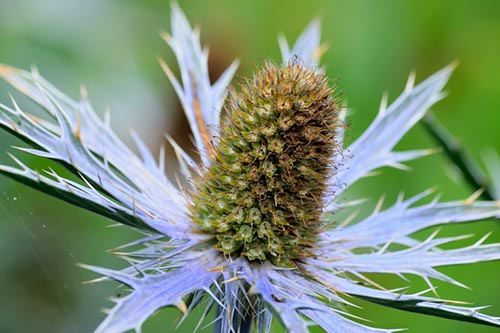
Thistle leaves. Photograph: Stevenson [/] / Shutterstock
Barbara: There are several poems in Ledger that hold the quality of surprise and joy – being present now with something as extraordinary as the leaf of a thistle. How often does this poetic impulse come to you in a perplexing world?
Jane H: Surprise and joy are rare in my life, in most lives. We exult in the leap of the athlete or dancer or eventing horse because leaping defies, for its impossible moment, gravity’s constant pull. Love, too, seems an unlikely triumph. To experience implausible surprise and uncontainable joy and unparaphrasable arc is no small part of what we turn to art to find. Life offers joy and surprise on its own schedule. Art offers a way to invite their visitation.
My second collection of essays, Ten Windows: How Great Poems Transform the World, has at its centre a piece called ‘Poetry and the Constellation of Surprise’.[2] I began by trying to figure out another question – how is it that great art preserves its perennial newness? The answer I arrived at was itself surprising. It had to do with the way art is a vessel for holding, then releasing within us, an unexpectable and unretainable experience. I can’t really summarise that essay here, I apologise. But after writing it, surprise became something I began noticing more. Surprise is a very brief experience, easily overlooked; we often fold it into the emotion that follows it. This awareness led years later, but directly, to another poem in Ledger, ‘I Wanted to Be Surprised.’ Thinking about surprise for that essay also changed my relationship to my poems’ crafting in general. I began reaching a little further into the implausible. Magical realism and the surreal aren’t the primary qualities in my work – but they are there. And of course any metaphor, looked at closely, is a teaspoon of surprise, of the surreal.
And yes, joy is needed as well. Joy and its near twin, the experience of beauty, act as antidote to the dampening, the difficulty, and the diminishments of adult life. In childhood, great happiness and profound grief run close to the surface. Adult life tamps these flarings of feeling down, so that practical tasks might be done. My poems in recent years have sought increasingly to notice joy, not least because, as the world has darkened, I’ve needed joy’s restorative counterweight. But the poems have also increasingly opened to grief, bewilderment, even to fear. The poems want – I want – to become the trembling compass of a full human life.
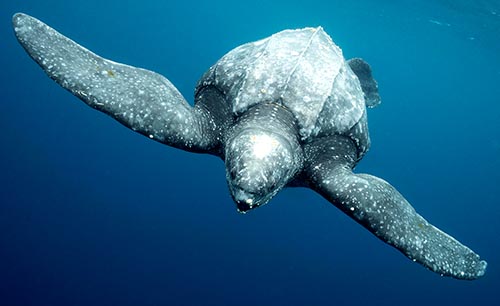
Pacific leatherback sea turtle in the Southwest Pacific Ocean. These ancient creatures, which can reach up to two metres in length, have existed since the time of the dinosaurs but are now endangered. Photograph: Doug Perrine [/] / Alamy Stock Photo
Death and Silence
.
Barbara: Our second strand, or theme, is ‘Death and Silence’, and the chosen poem is the one which you have already mentioned, ‘Ghazal for the End of Time’ (for Jane’s reading, see right or below).
Ghazal for the End of Time
Ghazal for The End of Time
(after Messiaen)
.
Break anything – a window, a piecrust, a glacier – it will break open.
A voice cannot speak, cannot sing, without lips, teeth, lamina propria coming open.
Some breakage can barely be named, hardly be spoken.
Rains stopped, roof said. Fires, forests, cities, cellars peeled open.
Tears stopped, eyes said. An unhearable music fell instead from them.
A clarinet stripped of its breathing, the cello abandoned.
The violin grieving, a hand too long empty held open.
The imperial piano, its 89th, 90th, 91st strings unsummoned, unwoken.
Watching, listening, was like that: the low, wordless humming of being unwoven.
Fish vanished. Bees vanished. Bats whitened. Arctic ice opened.
Hands wanted more time, hands thought we had time. Spending time’s rivers,
its meadows, its mountains, its instruments tuning their silence, its deep mantle broken.
Earth stumbled within and outside us.
Orca, thistle, kestrel withheld their instruction.
Rock said, Burning Ones, pry your own blindness open.
Death said, Now I too am orphan.
.
This poem is, as you say, the darkest one in the collection; the images are terribly painful. We are struck by the words ‘after Messiaen’ beneath the title. We are aware that Messiaen’s Quartet for the End of Time was written and first performed in the desperate conditions of a German prisoner-of-war camp in 1940 [/], for the four instruments available (piano, cello, violin and clarinet). The work has the qualities of both awe and ecstasy, with the words ‘praise’, ‘rainbows’ and ‘angels’ in the titles of its movements.
So we are wondering what the darkness of your ghazal points to. Are you suggesting that we are after Messiaen in historical time and in an even darker place than he was because the ecologically destructive processes have gone too far?
Jane H: This poem began as – rare for me – a commission. I was asked to write a poem for a superb anthology, Ways of Hearing: Reflections on Music in 26 Pieces. (3) It includes pieces by architects, physicists, conductors, philosophers, visual artists, and the late U.S. Supreme Court justice Ruth Bader Ginsberg. I chose Messiaen’s piece as my starting point for its haunting, uncanny beauty and complexity, but also because it let me think about the title’s proposition: ‘the end of time’. A life inside time is vanishing for leatherback turtles, for Hawaiian honeycreepers, for the already extinct Australian thylacine and Mauritian dodo. So yes, my poem is ‘after Messiaen’ in both senses you suggest – inspired by his piece, and also bringing his phrase and stated topic into a different context and era.
Messiaen described his ‘Quartet’ as an act of faith-affirmation, based on a passage in the biblical Book of Revelation. But for me, in the listening, it has never held the promise of harmony or eternal life. I hear in it grief, dissonance, sorrow, all the circumstances of its composition. Suffering has been brought into the ranges of beauty, but not erased. When two of the piece’s instruments vanish before its close – the silenced clarinet and cello of my poem’s third stanza – I hear extinction, not rapture. Art, in changed times, takes on changed meaning. My response to the quartet isn’t meant to contradict or disrespect Messiaen’s intentions. It holds my experience of his piece’s music, now.
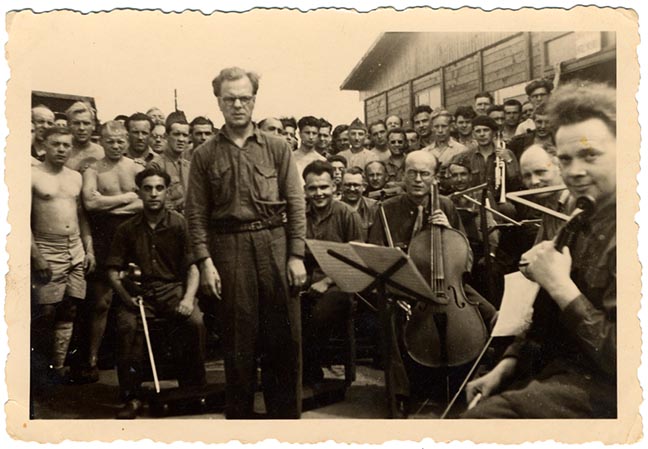
A prisoner orchestra at Stalag VIII-A in Goerlitz, Silesia (now Germany), where Messiaen wrote ‘Quartet for the End of Time’. Photograph: United States Holocaust Memorial Museum, courtesy of Sonia Beker
Jane C: I notice that you use the image of ‘opening’ throughout the poem, which slightly surprises me, as the poem is about the end of things, when we might think of them as closing down.
Jane H: The paradox of speaking of opening while thinking of ending is, yes, at this poem’s centre. I’m contemplating breakage, and a breaking always involves both fracturing and a new opening. Humility reminds me: I cannot ever know the future, cannot know what may come into existence through our current, broken-open moment.
Barbara: Is it your hope that readers might find in this poem a paradoxical strengthening against the despair that can threaten when we look at the state of the world?
Jane H: Yes, exactly. The thought of an unbearable future could easily lead only to despair and surrender, to evasion, to a plunge into distraction. Yet for me, the opposite happens. Despair awakens its own countering: determination. Whether or not hope is futile doesn’t matter. I cannot simply acquiesce to this festival of self-and-world destruction.
My first feeling about this poem, as I’ve said, was shock at its depth of abyss. The role of the poet is to see with open eyes, to feel with exposed nerve-ends, and to give name. The depth of the biosphere’s loss is not future: it is now, and actual. And into it, the poems come. To give voice and name, to imagine and feel the full consequence. To acknowledge and witness. And then also: to thank, to praise. As I said earlier: we only work to save what we first love.
Poems muster awareness, not action. A person writing or reading or hearing a poem is doing only that. But poems do make things happen. After I wrote an earlier poem in Ledger, imagining the future, ‘Let Them Not Say’, I became a person whose vow was to fulfil the poem’s premise’s mandate. I began to take some outward political action every day.
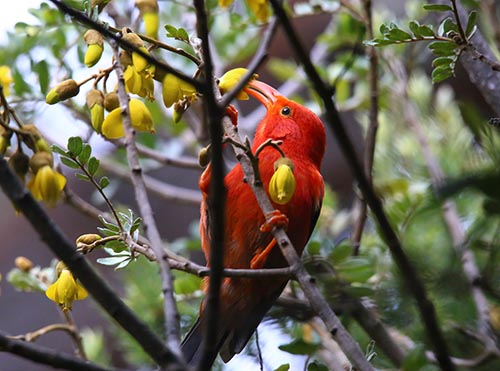
The Hawaiian Honeycreeper is found only in the forests of the Hawaiian Islands. At least eight of the original 23 species are now extinct, and most of the survivors are endangered. Photograph: Thomas Chlebecek [/] / Shutterstock
Jane C: You call your poem a ghazal – an Arabic form of love poetry. Is this poem then about the loss of what we love?
Jane H: I’ve never, myself, thought of ghazals as primarily love poems, though your thought about the loss of what is loved feels entirely fitting. My introduction to the ghazal form came from a 1971 Columbia University Press book, The Ghazals of Ghalib,[4] whose poems are seated primarily in the spiritual. Spiritual poetry in many traditions turns at times to the vocabulary of the lover. The Beloved is the divine in Sufi, Hindu and Islamic poetry. You see it also in the biblical Song of Songs. Longing is longing. Union is union. The impulses of eros and spirit to go beyond narrow self and narrow life are not so very separate.
I can’t recall precisely when in the process of finding this poem it became clear to me that it wanted to bow toward the form of the Persian ghazal. But by the time I had the first line’s statement and music in my ear, the ghazal’s energies and gravitation were shaping the poem that followed. I think differently when the engine of a poem’s thought is primarily sound-driven. Rhyme elasticises and magnetises both imagination and ideas.
The departures of this poem’s form from the traditional pattern have their own meaning. The line of short declarations – ‘Fish vanished. Bees vanished. Bats whitened. Arctic ice opened.’ – that is the drumbeat of a funeral cortège. That this poem’s form is a fractured, fissuring version of itself embodies and enacts its contents. The traditional exactly-repeated word at each couplet’s end becomes here unstable, for instance, mirroring the growing instability of our weather. What once could be relied upon now cannot. In a traditional ghazal, my own name would appear in the final couplet. In its place, I set down all our name: Burning Ones, as we are.
I’d like to add a moment’s thought about forms and their evolution, if I may. Here in the U.S., some years ago, a Persian-speaking poet famously rebuked the poetic community for not using the ghazal form correctly. Yet hybridity in poetic form, as it crosses time and languages and cultures, feels to me important and indispensable. Its evolution resembles the recombinations of biological DNA. New combinations bring forward new forms of beak and hoof, of thought and feeling. They expand the ranges – and the radiance – of the possible.
Jane C: You have taken an interest in other sorts of poetry – for instance, you have published co-translations of classical Japanese verse [5] – but you are also engaged in science. You’ve been a poet in residence in different scientific settings which encourage dialogue – a neuroscience department and an experimental forest – and founded ‘Poets for Science’ [/] in 2017.
Jane H: Poems reach into every realm of human life, into every form of investigation, feeling, and expression. Our lives are hybrid in multiple ways, how could our arts not be also? Across culture and category, even inside our own bodies, intermingling governs. For a person reading a poem that says ‘orange’, neuroscientists say, the tongue’s taste buds grow larger. If it says ‘ladder’, the legs’ muscles begin to grow ready to climb. A line of shaped ink somehow becomes the portal into every dimension of body, spirit and psyche, because what awakens that ink into meaning is the person reading – our lives, our libraries of multiple knowledges, our history, both as individuals and as parts of multiple communities of history, as humans, as animals. How can words on a page change a person’s molecules? Yet they do.
The lexicon of the sciences is one central repository of current understanding. Delving its cupboards’ shelves and file cabinets’ drawers, its rooms of reassembled skeletal bones and computer-code-held DNA, each new concept expands the knowable world, the knowable life. What a person learns about mosses, horseshoe crabs and lichens becomes what they know of themselves. It seems to me almost inevitable that I’d find my way to writing a poem (in an earlier book, The Beauty [6]) that includes natriuretic peptide b and the microbiome. The title is ‘My Proteins’, but the field of investigation is where self begins and ends, and the self’s felt, or unnoticed, connection to what’s beyond its own skin.
May I say one thing further about science and poetry? In our current political–cultural moment, when so much is asserted as if repetition alone made a thing true, research science feels to me a balancing practice, a necessary restorative against propaganda and the sway of rhythmic, memorable phrases. Beautiful language is a neutral technology, able to be turned in any direction. Even a poet is forced to concede why Plato was sceptical of letting poets into his ideal Republic. Research science, done rightly, is selfless, as a good detective is selfless. So I try to test my poems against reality’s rigour. Not to constrain the reach of emotion or imagination, but to focus them towards investigations whose outcomes might matter.
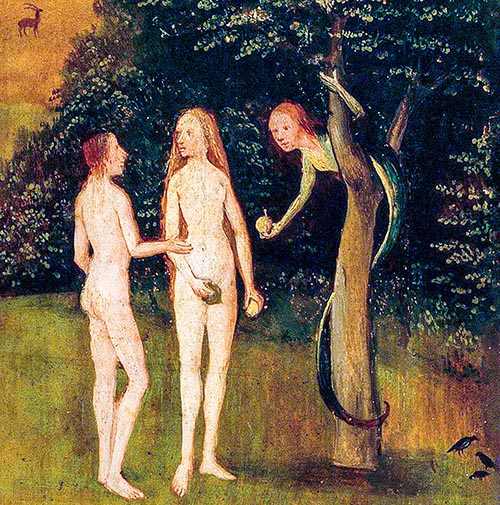
Hieronymus Bosch, The Hay Wagon (Prado, circa 1516), detail of Adam and Eve tempted with an apple by the serpent. Image: incamerastock [/] / Alamy Stock Photo
Our Curious Human Nature
.
Barbara: We chose this last poem, ‘Amor Fati’, to stand for many that seem to hold the paradoxes and sheer oddness of being human, often with an enigmatic quality. They sometimes make the reader smile, laugh even (for Jane’s reading, see right or below).
Amor Fati
Amor Fati
.
Little soul,
you have wandered
lost a long time.
The woods are dark now,
birded and eyed.
Then a light, a cabin, a fire, a door standing open.
The fairy tales warn you:
do not go in
you who would eat will be eaten.
You go in, you quicken.
You want to have feet.
You want to have eyes.
You want to have fears.
.
Here you seem to catch the human propensity for walking the knife-edges of experience – the pleasurable scariness felt by the child daring to do something slightly risky. It is also the desire for knowledge and curiosity of Eve as she considers eating the forbidden fruit in Eden, or even the call to the wandering soul coming into consciousness and life itself. Your poem is playful, but holds the serious creative possibilities of facing the dangers of the unknown.
Jane H: Oddity-appreciation and wonder are both qualities that matter to me. You’ve captured the poem beautifully in your comments. After my second book of poems, Of Gravity and Angels, was published, in 1988,[7] I read it through and felt two qualities were missing. And so I made a direct request to my muse: to become braver in the making of outright statements, and to become more strange. Both had to do with risk-taking, as does this poem.
One further aspect of this poem’s meaning for me comes from an element beyond its own words’ boundaries. Perhaps I should have put in a footnote, a dedication, something. ‘Amor Fati’ is the first of a series of poems in the book set off in a section of their own. All but the last have as their opening phrase what the Roman emperor Hadrian said in the one poem by him that we know, written on his deathbed. ‘Little soul’, he addressed his own departing spirit. More specifically still, the ‘little soul’ poems in Ledger also came from the three-year illness and death of glioblastoma in 2016 of my first love, the love of my twenties. These poems, written over that time, speak into his life and death, into my own, into all our mortality.
Life is perilous and requires courage – ‘you will be eaten’. But it’s also the one adventure we’re given to have. And so ‘Amor Fati’, this first poem contemplating my friend’s coming death, looked first, as you’ve noted, at the spirit’s willingness to be born, to live. To suffer, but also to taste the fairy tale cabin’s soup or stew or gingerbread. Recognition that assenting to joy means assenting also to suffering runs through all my books, along with its less visible counterpart: that the assent to suffering is the assent to joy.
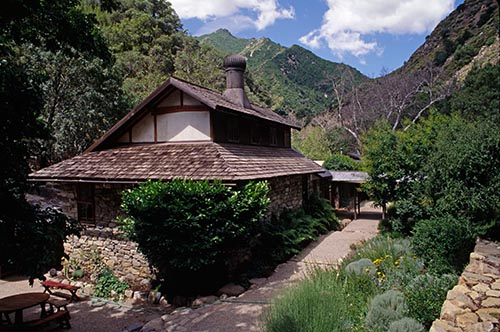
Tassajara Zen Centre in California’s Ventana Wilderness, where Jane spent three years in monastic training. Photograph: Craig Lovell / Eagle Visions Photography [/] / Alamy Stock Photo
Poetry and Zen
.
Jane C: You have been a long-time practitioner of Buddhism, and are initiated into the Soto Zen tradition. I know that you do not like to be pigeonholed as a ‘Zen poet’, but it seems incomplete not to ask you about this part of your life and its influence on your poetry.
Jane H: A book well known in certain circles is R.H. Blyth’s Zen in English Literature.[8] Blyth emerged from a World War 2 Japanese prisoner-of-war camp as one of the early translators of both Japanese haiku and the teachings of Zen to English-language readers. In this book, though, he points to the many classics of the Western tradition in which ideas recognisably ‘Zen’ already appear. In Shakespeare, in Wordsworth, and long before them, Heraclitus, Horace, there is ‘Zen’. To perceive the world as altering, transient, interconnected, as subject to suffering, doesn’t require any special vocabulary or training. These are human truths. Sometimes truths of physics: Lavoisier wrote in his 1789 Elements of Chemistry: ‘Nothing is lost, nothing created: everything is transformed.’
From childhood, anywhere I encountered these ideas, they felt to me an understanding that fitted my direct experience. When, in university, I read Chinese and Japanese classical poetry and Japanese Nōh plays and began looking at Buddhist art and texts, I found that their worldview, especially as presented in Zen, reflected my own. Gary Snyder gave a talk at an East Asian Studies coffee hour. From that, I learned that a living poet with a ponytail, earring, and sense of humour could practise Zen. Three years later, I drove over a somewhat perilous fourteen-mile mountain dirt road to the only Zen monastery that then existed in the U.S. I thought I would spend a few months learning a little more about what had so drawn me. That became eight years of formal training, three in that mountain wilderness monastery.
During training, we were told to do nothing outside of the practice. In those three years, I wrote one haiku. When I returned to a situation less strict, poems returned also. And there is of course a long tradition of the use of poems in Zen – in koans, in capping verses, in the tradition of writing a poem on one’s deathbed. In traditional Japanese culture, no experience was quite complete until brought into a poem. But I didn’t want to write ‘Zen poetry’. I wanted to write only the poems of my own tongue and time and life. If there is Zen in my poems – and people do find it there – it is because it’s in my tongue. I don’t want a conceptual barrier between any other life and my own. I don’t want people looking for anything hidden or special in my work. It’s not there. If it were there, it would not be Zen anyhow. It would be just one more stumbling block between the actual moment and the actual moment.
From childhood, reading and writing poems offered a life raft. Poems brought me to practicing Zen; Zen returned me to writing poems. These paths of understanding and embodied awareness have always felt to me the left foot and right foot of one walking. A human being’s walking, though, not a set of beliefs. Both Zen and poetry ask you to find your own footfall and language.
Barbara: We might describe you as a poet who explores the depths of the human condition, its extremes and paradoxes. Are you happy with such a description?
Jane H: Yes, I am.
But other aspects of poetry do also come into the exploration. Language aware of its own music is the marker of words doing the feeling–thinking of poetry. Awake diction, syntax, grammar, music, are instruments of seeing. Image, arc, the under-the-fabric back-stitching of uncertainty and the unspoken; the sense of an original saying and of an arrived-at alteration of understanding, of relationship of self and world; these are all part of any poem, for me. All are turned toward a shared end. In each poem, to bear witness to and carry forward this life I was given, that we each have been given, for a moment or two, perhaps for a few decades. Into our ten-fingered hands, into our two eyes, two ears, two legs, hungers, hopes, has come this unfathomable, immeasurable one-life quotient of life.
How astonishing that is. And so, we exclaim before it. Late in his life, the great Polish poet Czesław Miłosz wrote a series of very brief poems titled “O!” Perhaps that “O!” is every poem’s secret purpose and title.
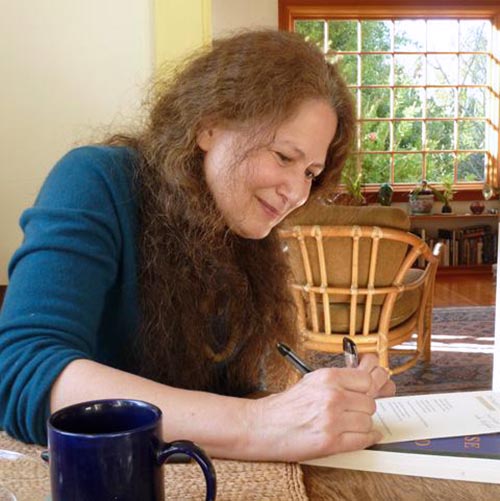
Jane Hirshfield. Photograph: Adam Phillips via Wikimedia Commons
Image Sources (click to close)
Banner: Jane Hirshfield, screen shot from a YouTube video where she reads her poem ‘The Envoy’. See https://www.youtube.com/watch?v=5Q4UpAkmS1Y
Other Sources (click to open)
[1] JANE HIRSHFIELD, Ledger (Bloodaxe, 2020).
[2] JANE HIRSHFIELD, Ten Windows: How Great Poems Transform the World (Knopf, New York, 2015 ). An earlier version of the essay appears in Hiddenness, Uncertainty, Surprise: Three Generative Energies of Poetry (Bloodaxe Lecture Series, Newcastle, 2008).
[3] SCOTT BURHAM, MARNA SELTZER & DOROTHEA VON MOLTKE [eds], Ways of Hearing: Reflections on Music in 26 Pieces (3) (Princeton University Press, Princeton, 2021)
[4] AIJAZ AHAD [ed], The Ghazals of Ghalib (Columbia University Press, 1971).
[5] JANE HIRSHFIELD and MARIKO ARATANI [trans], Ink Dark Moon:Love Poems by Ono no Komachi and Izumi Shikibu, Women of the Ancient Court of Japan (Vintage, 1990).
[6] JANE HIRSHFIELD, The Beauty (Bloodaxe, 2015).
[7] JANE HIRSHFIELD, Of Gravity and Angels (HarperCollins, 1988).
[8] R. H. BLYTH, Zen in English Literature (Angelico Press, New York, 2016).
My Debt
FOLLOW AND LIKE US
——————————————
——————————————
——————————————
Ghazal for the End of Time
Amor Fati
FOLLOW AND LIKE US
If you enjoyed reading this article
Please leave a comment below.
Please also consider making a donation to support the work of Beshara Magazine. The magazine relies entirely on voluntary support. Donations received through this website go towards editorial expenses, eg. image rights, travel expenses, and website maintenance and development costs.
READ MORE IN BESHARA MAGAZINE
Robert Lax: A Life Slowly Lived
Robert Hirschfield writes on the contemplative practice of a remarkable 20th-century poet/mystic
World Literature Decentered
Ian Almond proposes a more inclusive approach to comparative literature, and explores the cultural traditions of Turkey, Mexico and Bengal
A Thing of Beauty…
Mark Boston reflects on his experience of working on the film Loving Vincent, an animated depiction of the last days of Van Gogh based upon his paintings
Exploring the Power of Love in ‘Attar’s Conference of the Birds
Kenneth Avery explores the famous story of Shaykh San‘an and its message of love and friendship across religious boundaries
READERS’ COMMENTS

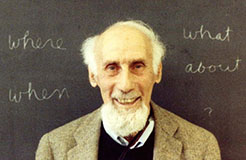
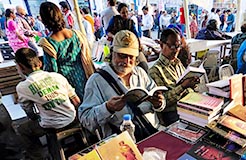
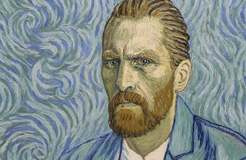
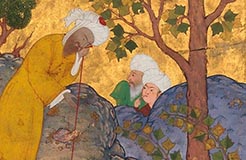
As an artist struggling to understand what the neuroscientists are saying about perception and the senses I found the sheer courage of Jane Hirschfield very strengthening. And your questions had the same quality, unafraid to ask what you want to know. Thank you all.
Fabulous conversation. Please correct typo in the footer of the pdf.
Our arts have been stripped of their hybridity across the centuries. A dancer is a dancer plus nothing. A singer is a singer plus zilch. And so it goes. The challenge is to return to a storytelling artistry as once was – a confluence of voice, mime, movement, dance, gesture, wordplay, gravitas, tomfoolery …
Our today’s digitisation-of-almost-everything is a full frontal assault on the potentialities latent within the glorious mix and hybridity of our wilderness humanity.
Can poetry bind together what is now flailed and fragmented? Can the juxtaposition of a poet’s words and words alone remind us of the freshborn wonderment we once knew but is now bleached day by day by a torrent of zeroes and ones and ones and attention/joy eroding zeroes?
My 94th birthday is a few days away. My on-going poetic urges are honored and encouraged by these wonderful poems and commentaries! I grieve what my kind has done to the planet. I foresee the end of humankind,/unkind. I am incarcerated/cherished in a senior residence. I have to learn daily how to turn boredom and despair into gratitude and “O!”
1